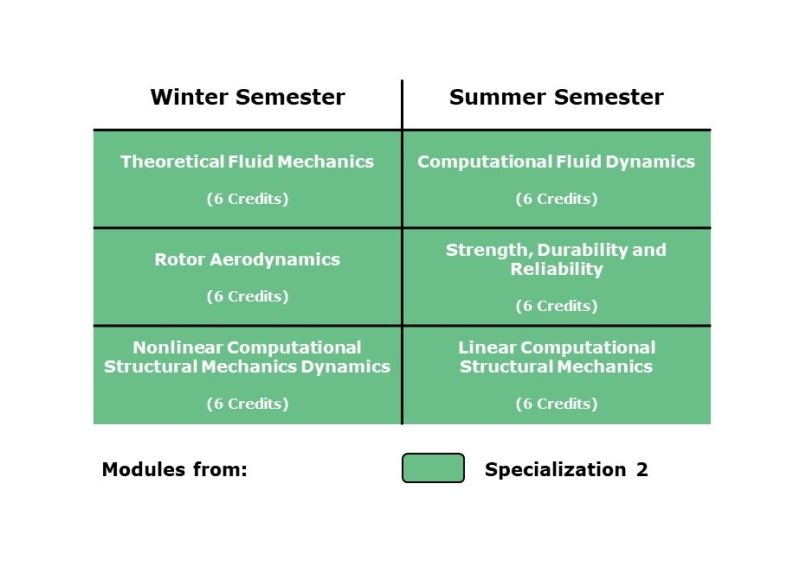Computational Wind Energy Systems
The content on this page was translated automatically.
Profiles
Studying the certificate 'Computational Wind Energy Systems' requires the successful completion of the certificate 'Scientifically Oriented Fundamentals of Wind Energy Systems'. It provides a profound knowledge of computational methods used for the static and dynamic analysis of wind energy converters and the surrounding wind and water flows at an expert level. The goal of the certificate is not only to enable engineers to apply existing commercial software packages for structural and fluid mechanics in a sophisticated manner as a basis for reliable prognoses of the mechanical behavior of wind turbines, but also to improve the quality of numerical methods and to develop more realistic models of wind energy systems. These aspects are fundamental ingredients for the engineering optimization of state-of-the-art wind turbines and their future innovative designs with a higher energy eciency, life time, degree of capacity utilization and robustness with regard to extreme load cases.
Certificate Modules
| Theoretical Fluid Mechanics | Description | |
| Computational Fluid Dynamics | Description | |
| Linear Computational Structural Mechanics | Description | |
| Non-Linear Computational Structural Mechanics | Description |
and selection of one module from two available modules:
| Rotor Aerodynamics | Description | |
| Strength Durability and Reliability | Description |
Qualification
The participants of the certificate program will learn about classical, current and future numerical methods for the solution of advanced mechanical models of wind turbines and the surrounding fluid flow. They will know the advantages and disadvantages of models and numerical methods and they will recognize which combinations of models and numerical methods can be efficiently and trustworthily applied for special kinds of structural and fluid analyses. Furthermore, the students will be familiar with the limitations of the models and numerical methods and they will overcome these limitations by writing their own partial programs for special tasks in their professional career. Based on their ability to perform realistic simulations of structural and fluid flow behavior, they will be engineers in charge of the development and design of current wind energy converters, structural safety, new developments of detailed aspects, and general novel designs of wind turbines.
Certificate Fee
€6,000 (30 credits)
How this fits into the master's program
Crediting
All 30 credits of the certificate 'Computational Wind Energy Systems' will be accepted for the complete master's study program Online M.Sc. Wind Energy Systems.
Certificate Director
Prof. Dr.-Ing. Detlef Kuhl
<link mail>write an email
<link>apply for certificate
Profile
Participation in the 'Computational Wind Energy Systems' certificate requires successful completion of the 'Scientifically Oriented Fundamentals of Wind Energy Systems' certificate. It provides an expert-level knowledge of computational methods for the statistical and dynamic analysis of wind turbines and the surrounding wind and water flows. The goal of this certificate is not only to enable engineers to apply existing commercial software packages for structural and fluid mechanics in a sophisticated way as a basis for reliable predictions of the mechanical behavior of wind turbines, but also to improve the quality of numerical methods and procedures in order to develop more realistic models of wind turbines. These aspects are essential components for the technical optimization of modern wind turbines and their future innovative designs with higher energy efficiency, lifetime, load factor and robustness against extreme load cases.
Certificate modules
| Theoretical Fluid Mechanics | Description | |
| Computational Fluid Dynamics | Description | |
| Linear Computational Structural Mechanics | Description | |
| Non-Linear Computational Structural Mechanics | Description |
and selection of one module from two available modules:
| Rotor Aerodynamics | Description | |
| Strength Durability and Reliability | Description |
Qualification
Participants of the certificate will learn classical, current and future numerical methods for solving advanced mechanical models of wind turbines and their flows. They will know the advantages and disadvantages of models and numerical methods and will be able to evaluate which combinations of models and numerical methods can be used efficiently and safely for specific types of structural and flow analyses. In addition, students will be familiar with the limitations of models and numerical methods and overcome these limitations by writing their own subroutines for specific tasks in their careers. Based on their ability to perform realistic simulations of the structural and flow behavior to which wind turbines are subjected, they will be responsible for the design of current wind power converters as well as the new and further development of individual aspects and complete designs of wind turbines.
Certificate fees
6.000 € (30 ECTS credits)
Classification in the master program
Credit
All 30 credits of the certificate 'Computational Wind Energy Systems' are recognized for the master program Online M.Sc. Wind Energy Systems.
Certificate Director
Prof. Dr.-Ing. Detlef Kuhl
<link mail>Send e-mail
<link>Application for the certificate

